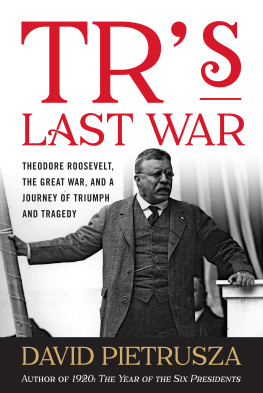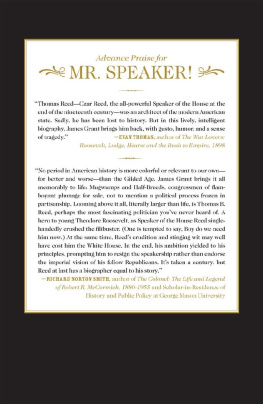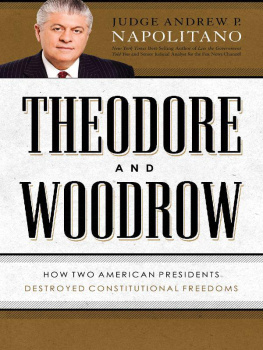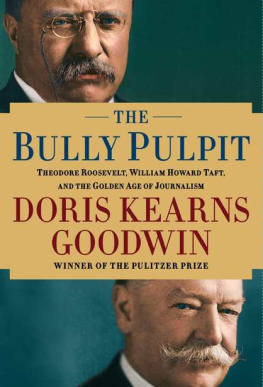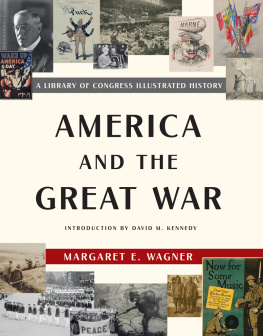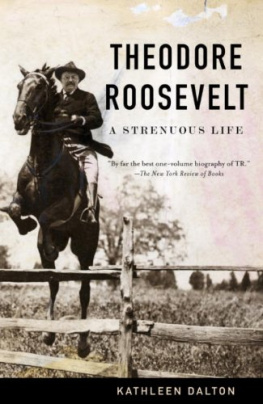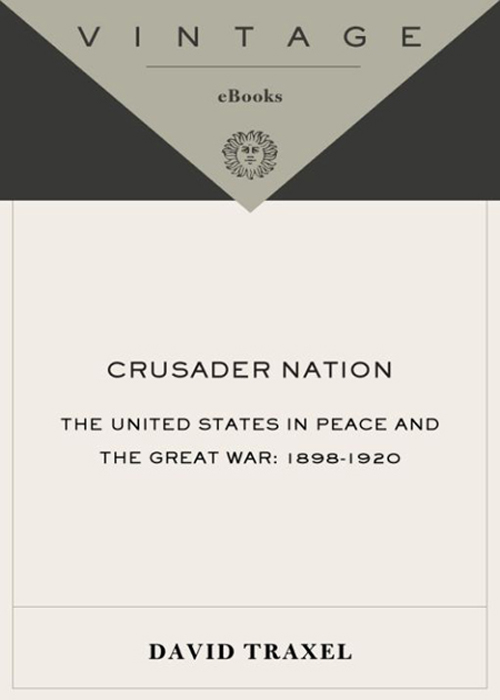
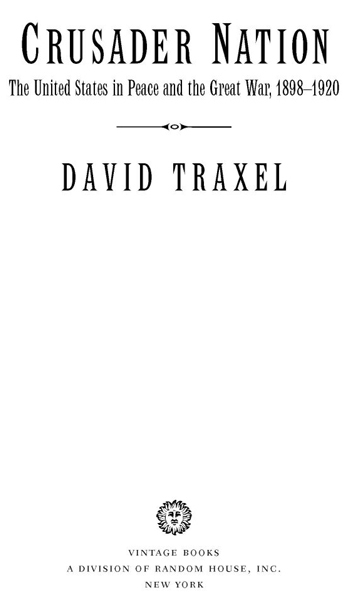
Table of Contents
For Rosemary:
And you wait, are awaiting the one thing
that will infinitely enhance your life;
the powerful, the uncommon,
the awakening of stones,
depths turning toward you.
Rilke
Praise for David Traxels
CRUSADER NATION
In an elegant and substantive narrative history, Traxel re-creates America during the Progressive Era, a time when politicians, church leaders and ordinary citizens were on fire to reform society.... The book reads seamlessly, and it will serve a scholarly and general audience as a summary of an important era in U.S. history.
Publishers Weekly (starred review)
David Traxels compelling Crusader Nation is a beautifully written narrative history of America at the dawn of the twentieth century. Whether he is writing about Theodore Roosevelt or Big Bill Haywood or Pancho Villa, he is always on the mark. A truly smart book.
Douglas Brinkley
Here, over twenty years, was the stunning rise of the crusader spiritmuscular, reformist, big-heartedand its equally sudden wane. Writing with force, passion, and scope, David Traxel takes the reader through a fascinating kaleidoscope of events at the start of twentieth-century America. Bravo for this significant achievement.
Jay Winik
Traxel keeps a sharp eye out for historical patterns and luminous moments.
Kirkus Reviews
Engaging history.... Traxel... offers observations that attract and enlighten.
The Decatur Daily
Preface
There are few periods in American history filled with such troublesome, adventurous, and challenging events as the first decades of the American Century. The United States had undergone enormous economic and social upheaval in the 1880s and 1890s as a ruthless industrial manufacturing system evolved while millions of impoverished immigrants poured in to work and suffer in factories and mines. The sins of uncontrolled industrial development inspired passionate crusades for reform that had many goals: stop child labor and other exploitive employer practices, extend democracy through votes for women, rein in irresponsible plutocrats, expel corrupt big-city machines, and prohibit the social evil of alcohol. Crusaders ranged from foot soldiers of the Democratic and Republican parties to ardent Socialists, to members of even more radical organizations such as the Industrial Workers of the World and antiorganizations such as Emma Goldmans anarchists. All had faith in their particular visions for the good society and fought to establish these with a passionate intensity that often blinded them to other points of view.
This Age of Progress was also marked by the wide range of articulate and dedicated people who were both participants and witnesses to the momentous transformations taking place. There were colorful politicians such as Theodore Roosevelt and Woodrow Wilson trying not only to control the giant corporations dominating the new economy but also to contain and direct the forces of reform that had been unleashed. These men, though once admirers of each other, became bitter enemies over questions of political philosophy, and their relationship was made even worse by personal jealousy. The radical journalist John Reed is another of the individuals whose lives illuminate the times. A graduate of Harvard, he was one of the early bohemians of Greenwich Village, enjoying numerous love affairs and great success in his writing about revolutionaries here and abroad. Young America was rebelling against the strictures of the Victorians, a rebellion that was reflected in all aspects of life, from the new sexual mores, dance crazes, and jazz music to politics. It was a time of old certainties under attack from those who were just as certain about what they believed.
The outbreak of the European war in August 1914 began to shift the attention of Americans to international concerns. Most were sure that their country could avoid becoming involved, and felt morally superior to the belligerents, though they were grateful for the flood of war orders that turned a stagnant economy into roaring prosperity. Great Britain, controlling the sea-lanes, benefited most from American productivity, but that was countered by Germanys submarine fleet. Woodrow Wilson, recognizing the dangers of involvement, pleaded in vain with his fellow citizens to stay neutral, but for a nation of immigrants with ties of blood and culture to the warring nations, that proved impossible. Social activists such as Jane Addams organized a peace movement, finding an ally in Henry Ford, who revolutionized American life during these years through his Model T. The automaker launched his own crusade to stop the war, financing the Peace Ship of December 1915 and accompanying it to Europe, naively assuring the public that he would end the war in a few weeks.
But soon the country was drawn into the war itself by acts that included the sinking of the Lusitania and a German sabotage campaign against American industry directed by Franz von Papen, military attach at the German embassy, who a couple of decades later would play a role in the rise of Adolf Hitler. Germany was also involved in fomenting deadly raids along the Mexican border, so that when the kaiser proposed that Mexico and Japan join with him to make war on the United States, the threat was taken very seriously. The country entered on a crusade in 1917 that, typically, was not just to defend the countrys interests, but to make the world safe for democracy, a struggle that would make war impossible in the future. The results of that great campaign are in some ways both the culmination and the defeat of progressivism. America relied on many of the same tactics that had been used to such effect in the reform campaigns, such as morally charged publicity to generate support for the cause. Progressive goals, including prohibition and votes for women, were achieved partly because of the war, as is the extraordinary, and brief, use of government power to contain capitalists accustomed to the freedoms of laissez-faire. Unfortunately, crusades also lead to a moral self-righteousness that makes dissent intolerable, and civil liberties were suppressed for the duration. Such passionate commitment could not last. The reality of a victory for idealism that later seemed much like a defeat is one of the factors that brought Warren G. Harding and conservative Republicans back to power through the election of 1920. As H. L. Mencken wrote that year, people were weary of hearing highfalutin and meaningless words; they sicken of an idealism that is oblique, confusing, dishonest and ferocious. The American crusades that had been dedicated to changing first the nation and then the world had been, temporarily, defeated.
CHAPTER ONE
American Renascence
Looking back... I have thought of the period in America, including the last few years of the nineteenth century and the early yearsof the twentieth, as the American Renascence, even the GreatAmerican Renascence.
Ray Stannard Baker1
You see, getting down to the bottom of things, this is a pretty raw,crude civilization of ourspretty wasteful, pretty cruel, whichoften comes to the same thing, doesnt it? And in a lot of respects weAmericans are the rawest and crudest of all. Our production, ourfactory laws, our charities, our relations between capital and labor,
Next page

